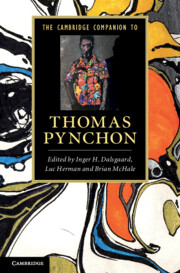8 - Pynchon’s intertexts
from PART II - POETICS
Published online by Cambridge University Press: 28 March 2012
Summary
In 2006 when Ian McEwan was accused of plagiarism in his novel Atonement, Thomas Pynchon unusually broke his silence to publish a letter of support, where he declared:
Oddly enough, most of us who write historical fiction do feel some obligation to accuracy […] Unless we were actually there, we must turn to people who were, or to letters, contemporary reporting, the encyclopedia, the Internet, until, with luck, at some point, we can begin to make a few things of our own up. To discover in the course of research some engaging detail we know can be put into a story where it will do some good can hardly be classed as a felonious act– it is simply what we do.
Giving us a rare glimpse of his working methods, Pynchon points out in effect that his fiction consists to an important extent of a montage of historical material garnered from diverse sources. This does not mean that the only thorough reading of Pynchon must be a study of his sources, but rather that we should approach his texts as fields where different representational systems and verbal registers are constantly encountering one another. Julia Kristeva's explanation of intertextuality is particularly helpful here since she describes a process of transposition, revealing “the signifying process' ability to pass from one sign system to another, to exchange and permutate them.”
- Type
- Chapter
- Information
- The Cambridge Companion to Thomas Pynchon , pp. 112 - 120Publisher: Cambridge University PressPrint publication year: 2011

